CHASING THE INDRI
Journey To Beauty & Chaos In Paradise Islands
Comoros:
Volcano, Decay & Illusions In The Islands of The Moon

Journey To Beauty & Chaos In Paradise Islands
Comoros:
Volcano, Decay & Illusions In The Islands of The Moon
Comoros:
Volcano, Decay & Illusions In The Islands of The Moon
Comoros,
Islands of the Moon, in the Arabic language.
Romantic the name may be, but the Comoros, an archipelago of four large
islands halfway between the coast of East Africa and the northern tip of the
island of Madagascar, has a most unsavoury reputation in the last three decades.
With 600,000 people squeezed onto 2170 sq km, the Comoros are a very
small and crowded island chain, perhaps with more coups per capita per year than
any country in the world.
Since independence from France in
1975, no less than twenty coups or attempted coups d’etat had occurred, with
the first coup occurring less than one month after independence.
The first two presidents were brutally killed in coups, and South
Africa-backed white mercenaries ruled the country behind the presidential throne
for much of 1970’s and 1980’s. Political
and natural disasters continue to plague the country, till this very day.
----
“Welcome
to the five-star resort!” I told E, jokingly of course, as our plane landed in
the tiny international airport of Moroni, the ramshackle capital of desperately
poor Comoros, located in the nation’s largest island, Grande Comore.
Taxi drivers and touts of various kinds surrounded us as we stepped into
the arrival room (- note I avoided the word “hall”) of the terminal
building, its inner walls unpainted and covered with an amazing kaleidoscope of
spider web. Even at this point we
had neither collected our luggage nor gone through passport controls.
Welcome to Chaos!
Anyone
can enter the Comoros. You simply
queue behind a passport check counter (or just walk around it!) to get your
passport stamped by a bored official who would stamp it without even the
simplest glance at you. They have
probably figured out that things are so bad here that no one would want to come
and stay illegally anyway. You only
need to pay them a visa fee of about 6 euros before you leave the country.
Just
as we struggled through the masses of unwelcome touts after getting our
passports stamped, loud vibrant beat of drums followed by chucking of the
tongues and sharp pitch shirks were heard coming from the entrance of the
building. A crowd of twenty odd Comorian women, dressed in their
finest, refreshingly colourful and almost flamboyant national costumes, were
screaming their heads off as a tall Comorian man in formal shirt and tie stepped
into view, smiling and waving his arms at an admiring crowd.
The drums rolled further and a hysterical-looking lady stepped forward,
heaping praises (or so I thought) on this handsome young man – possibly in his
mid thirties - who had flown from Paris via Seychelles, with his wife and baby
son. The rest clapped loudly, obviously approving the gesture,
while other women in conservative burqa preferred to watch from a far corner,
with their aristocratic husbands in flowing Arab robes, betraying the partial
Middle-eastern heritage of these islands.
“A
singer,” murmured a man who stood near me.
As
I was happily snapping pictures away, a huge pot-bellied white man waved at me.
“Wee Cheng? I’m Michel from
Villa Jessica. Welcome to
Comoros!”
I
have earlier gotten touch with Michel’s wife, Cécile, on the internet.
This charming French couple rents out rooms in their pretty mansion in
Moroni for a reasonable rate. Most
importantly, they speak English. There
are no English guidebooks available about the Comoros and I felt that it was
important to stay at a place where I could find out more on what to do and see
here.
Michel
and his Comorian driver helped us with our luggage, and then got us into his
rather battled car. As we drove
away stirring a snowball of dust behind us, I pointed to the celebratory crowd
still at the terminal building, “singer?”
“What
singer? Just another guy who have washed toilets in Marseilles for 10 years and
now returning home for a visit. He’s
going to spend all his savings in one week here, giving presents and throwing a
party for everyone he knows and doesn’t.
His relatives and friends are here to welcome the arrival of the money
machine!”
“This
is the Comoros. I have been here
for 37 years, witnessed 17 coups out of 20 odd and this country has seen nothing
but decline, year after year! 100,000
people – one sixth of the population – live in France, and if not for the
remittances of these French-Comorians and international aid, the people living
here would have starved to death!”
And
he went on and on as we drove southwards along the potholed road to Moroni,
under the tropical shades of coconuts and travellers’ palms, passing an
occasional village of dilapidated houses of dried mud walls and aluminum sheet
roofs.
To
the far left, always, is the Karthala Volcano, 2361 meters, with the largest
active crater in the world – three by four kilometres in dimension - rising
high up above the thick canopy of tropical jungle.
In fact, the entire island of Grande Comore is a gigantic volcano which
rises from the deep ocean. It
slopes more gently on its western side to form the narrow coastal strip, now
home of most of the island’s inhabitants.
Karthala dominates the entire isle and you can see it everywhere on
Grande Comore.
Pointing
to the smoke and dust covering the dome of the volcano, Michel said, “Look at
Karthala. All that smoke appearing the past few weeks.
Seismic activity has increased significantly the past few days.
French scientists monitoring it say Karthala is going to erupt anytime,
and the French Embassy has issued an alert.”
“What?”
I couldn’t believe my ears.
“Yes,
that’s what they say. Karthala
erupts every 10 to 20 years and a village or two gets destroyed. That’s
nothing if you have twenty coups in twenty-eight years.”
I
could only grin. In any case, the
next flight is two days’ time and we could only hope the volcano doesn’t
erupt by then or we wouldn’t be able to get out.
“Don’t
worry, my friends. Leave everything in the hands of Allah, the Comorians will
tell you. If the volcano doesn’t
get you, the next coup might. So
why worry so much!” Michel laughed. “I’m
more worried if you don’t get electricity today.
Electricity has been off the past 2 weeks now that only one of the six
power stations are operating.”
Before
long, we were in the dilapidated centre of Moroni and its messy traffic. Michel’s driver negotiated smartly around the chaos and we
arrived at Villa Jessica, a pretty mansion with a cosy garden of exotic tropical
plants and eight giant tortoises. As
we stepped into the house, Michel exclaimed, “Allahu Akbar! Allah is Great.
We have electricity today!”
----
The
Comoros comprises, from west to east, the islands of Grande Comore (known as
Njazidja), Mohéli (Mwali), Anjouan (Nzwani) and Mayotte (Mahoré).
(Names in the more commonly known French version, and Comorian Swahili in
brackets). The last remained a
French territory (as a so-called “territorial collectivity”), after its
voters chose in two referendums not recognized by the African Union to stay in
France when the rest of Comoros declared independence in 1995.
The
Comorian nation are a mixed people, of Arab, African, Malagasy and Creole
origins. Arab and French are
official languages. Almost 90% of
the population is Sunni Muslim and almost all speak a Comorian dialect of the
Swahili language commonly spoken on the east coast of Africa.
This
is one of the world’s poorest countries, with a GDP per capita of only US$710,
with 60% of the population below poverty line.
Most of its income is derived from agriculture, which employs 80% of the
work force. Yet it is not
self-sufficient in food production – there is limited arable land in the
Comoros, and political chaos have disrupted cultivation.
Besides, its young population is growing too fast at 3% per year, in a
country where there are few jobs. Remittances
from the 160,000 Comorians living abroad, as well as foreign aid, whether in
food or funds, have become a major source of subsistence in this country.
Most
notably, the Comoros is the world’s largest producer of ylang-ylang, which is
used in the production of perfume, and the world’s second largest producer of
vanilla. When you have ice cream at
Swenson’s after shopping for perfume and cologne, think about Comoros and its
coups d’etat.
----
We
spent our first day here wondering around Moroni.
This is a terribly run-down capital.
Pot-holes everywhere, some of which large enough for one to fall into.
It’s as though someone had dug out three metres deep holes to lay
pipes, and then forgotten to lay the pipes in or even cover the holes up.
The shops sell substandard merchandise and there are very few restaurants
or even simple eating-places. We
have a brochure that has colourful ads of hotels and restaurants, but most of
them don’t seem to operate anymore. Political
instability drives out business, tourists and everything that is good.
The
pathetic state of Moroni also proves the “Critical Mass Theory” of a
Colombian banker friend of mine. According
to this theory, a society, no matter how rich or poor, needs to have a certain
number of people to support amenities and businesses that make it vibrant, fun
and liveable. Once a critical mass
in population is achieved, there is always a large enough middle and upper class
in absolute number to support nice things like fancy restaurants at reasonable
prices, cinemas and bookshops, even though that middle and upper class may be
small as a percentage of the population.
Moroni
has 24,000 people and the entire island of Grande Comore only 260,000 people.
Combined this with a GDP per capita of US$710, you have a very small
local economy with little spending power. That’s
why although Madagascar is only slightly better off with a GDP of US$870, its
capital of 2 million people (and 16 million in the whole country), Antananarivo,
has lots of restaurants, night clubs, cinemas and more.
With
a heavy dose of coup d’etat fever, no wonder few diplomats want to be
represented here. There were only
two foreign embassies here – that of France and China, both of which have
political interests to maintain. The
Americans have long ago pulled out, in 1993.
France,
the ex-colonial power, remains Comoros’ chief donor. Roads, bridges and
construction in many places bear plaques or billboards indicating European Union
funding. However, like most
mismanaged countries, whatever infrastructure built has been left to deteriorate
and eventually fall into disrepair and disuse.
China,
faraway from these remote isles, is here for another reason: To ensure that the
Comoros do not switch recognition to Taiwan, like Sao Tome and Principe, Nauru,
Nicaragua, Paraguay and other poor small countries.
To achieve this, China finances huge infrastructure projects or provides
cheap loans to these countries. Taiwan
does likewise to those countries that support Taiwan. In the Comoros, China has
built a satellite transmission station and a monolith structure called the
Palace of Culture where major state ceremonies and events are held.
When
we passed by that so-called Palace of Culture one evening, we heard drums
beating and loud music in near absolute darkness.
President Azali, who as a colonel in the Army gained power through a coup
d’etat in 1999, was attending a major event with local dignitaries in the
Palace (which was lit up) but since none of the lights outside were working, the
cultural dance troupe had to perform in darkness.
Even the palace proper itself was in an advance state of deterioration
– some of the window-panes were broken and paint was fading from the walls.
I was to see similar lack of maintenance and deterioration of public
buildings and infrastructure in Madagascar.
Is it the lack of suitable maintenance expertise, or of funding?
I suppose the tax revenues have gone to maintain the private villas of
these leaders on the French Riviera instead!
----
We
discussed if it was worth the effort for corrupt individuals to launch coups in
such poor small countries. My
argument is, it probably is, despite the Critical Mass Theory.
Take the case of Comoros, a miserably poor country whose citizens have to
work abroad to support their dependents at home. With 160,000 nationals living abroad, they have to make
expensive international phones either way – most of the time calling from
abroad. Even then, the telecom
company would make a fair bit of money and hence a Comoro telecom license is
worth something. If you are a
corrupt dictator, that is a good cash cow.
Or
say, you decide to build a road, maybe a short one.
Ask the aid donors for US$5 million.
Get your construction company involved, or get some kickbacks from the
company engaged, or even better, steal it directly from the donors, if there
aren’t sufficient controls and monitoring over how funds are disbursed.
----
Apart
from massive political upheavals, the country suffered from the eruption of
Volcano Karthala in 1977 and cyclones in 1980’s.
As the country struggled to rebuild itself in the 1990’s, its already
fragmented federation (i.e., excluding the island of Mayotte – split apart in
1997 when the islands of Anjouan and Moheli left the federation, leaving only
the largest island, Grand Comore, remaining.
Anjouan, seeing the prosperity of Mayotte under French rule, asked France
to “recolonise” the island. Thanks,
but no thanks. Who wants to support
another bankrupt island of little value? In
2002, after failed “federal” invasions of Anjouan and Moheli, plus mini
civil wars and attempted coups in Anjouan, the three islands agreed to reunite
again in a loose union known as the Union of Comoros, with the substantial
autonomy for each of the three island states which will have their own president
and government. So, now there are
four presidents in one tiny country of three islands and 600,000 people!
Just
as the new union was set up after four referendums and eight elections, the
country is in crisis again. This
time, it’s the federal president against the president of Grand Comore, where
Moroni, the federal capital is located. Both
disagreed on who should run the army and collect taxes.
There we go again. Will the
Islands of the Moon ever be at peace?
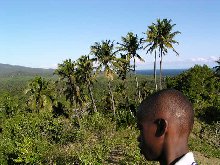 |
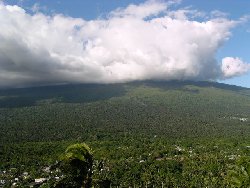 |
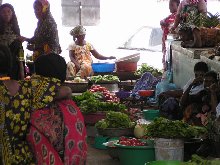 |
|
| Iconi | Jamal at Karthala | Smoky Karthala Volcano | Market at Moroni |
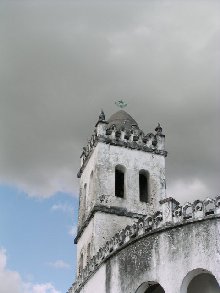 |
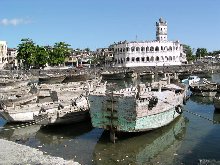 |
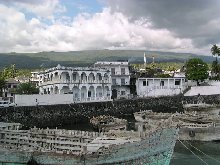 |
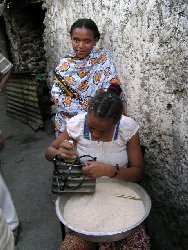 |
| Friday Mosque | Moroni Harbour with Friday Mosque behind | Moroni and the volcano | Locals |
Michel,
the owner of Villa Jessica, is a man of unusual patience.
In his late forties, he had spent 37 years in these accursed islands.
He was born in Madagascar of French parents, who moved to Comoros.
He grew up here and was in love with the carefree life island life
endows. He studied in France and
brought his French bride back to these islands.
Since
then, he had witnessed 17 attempted coup d’etats, which he dismissed as minor
gunfights with not more than two or three shots.
Some of the coups were staged by white mercenaries who numbered about
twenty to thirty men. The moment
shots were fired at army barracks and the presidential palace, the five hundred
men-strong Comoros Army would surrender immediately.
Why risk your life if you haven’t gotten paid for months? The
mercenaries and new coup leader normally come with promises of full payment of
salaries owed by the overthrown government.
The new day will begin with soldiers of the Old Army queuing to sign up
in the New Army and collecting their promised paychecks.
So, do you want to stage your own coup?
Whenever
a coup occurs, Michel would stay at home, gives his “boys” – as he calls
his Comorian servants – some money to buy some meat from the market in order
to have home-cooked meals for a few days of self-imposed curfew.
You wouldn’t to wander on the streets when trigger-happy soldiers go
looting or searching for supporters of the previous regime.
Michel
works for a French development aid agency but foreign donors are getting tired
and impatient. “The Comorians are
only interested in fighting among themselves.
Every time there is a coup, we are back in square one.
The donors feel that they are wasting their money.”
Michel
also runs a candy factory that uses its own generators.
He used to run a cookies factory too, but power shortage has made
operating costs too high. “It’s
cheaper to import cookies from Madagascar or Tanzania. It’s impossible to run
production if you get power for 5 hours a day for 2 weeks and then no power for
one whole month,” he said.
Villa
Jessica is his pride and he used to get a number of tourists.
Nowadays, nobody comes here apart from newly posted French diplomats, aid
workers and an occasional adventurous Frenchmen living in Mayotte (where there
are 10,000 Frenchmen) coming here for a weekend break.
Indeed, the only people who were staying there when we came were two
Frenchmen - an urbane diplomat and an engineer here to install the Comoros’
first GSM network.
“This
is a messed-up country. It’s
getting worse and worse every year,” Michel gets frustrated, but you wonder
why he has stayed here for 37 years. Perhaps,
he had stayed initially in the hope of better days, and now, he is staying
because he had stayed so long that he no longer has anywhere else to go.
Indeed,
he is something of a local notable, or so he claims: “If you get lost, just
tell anyone that you are a friend of Michel Bom Bom, and they will bring you
here safely.” So, remember Michel the Candy Man.
----
Comoros
is one of those places with there are many versions of the founding story.
For the size of the country and population, that is just bloody too much
and way too complicated, just like its politics.
Here
are some of them according to the Congress Library Handbook:
“Local
legend cites the first settlement of the archipelago by two families from Arabia
after the death of Solomon.
Legend
also tells of a Persian king, Husain ibn Ali, who established a settlement on
Comoros around the beginning of the eleventh century. Bantu peoples apparently
moved to Comoros before the fourteenth century, principally from the coast of
what is now southern Mozambique; on the island of Nzwani they apparently
encountered an earlier group of inhabitants, a Malayo-Indonesian people.
A
legend is recounted on Comoros and on the East African coast of seven Shirazi
brothers who set sail in seven ships, landed on the coast of northwest
Madagascar and on Njazidja and Nzwani, and established colonies in the fifteenth
century. The Shirazi, who divided Njazidja into eleven sultanates and Nzwani
into two, extended their rule to Mahoré and Mwali, although the latter in the
nineteenth century came under the control of Malagasy rulers.”
For
a small island of 1148 sq km and eleven sultanates, Njazidja (Grand Comore) has
way too many sultans! The island
needed a major M&A consolidation. Maybe
I shouldn’t be too surprised at the separatist tendencies of Anjouan and
Moheli, given that there used to be a dozen or more countries on these four
islands a century ago. OK, will
Richmond declare independence from the UK, or how about Central Park Manhattan
an independent principality?
----
We
walked into the National Museum, which is more like a poorly looked-after
warehouse of spiderwebs, decaying paintings and historic photographs half-eaten
by moths. After a principled but
ultimately resultless argument with the curator over his attempt to cheat us of
some change of insignificant amounts, we aimed for the rare coelacanth exhibits.
The coelacanth is a prehistoric family of deep-sea fishes with limblike
fins which man first knew as fossils. They were thought to have lived 400
million years ago and gone extinct 70 million years ago, until live specimens
were found in 1938, in the Comoros. For a nation with few unique national
symbols, the coelacanth has become an icon which appears on souvenirs and public
buildings in the Comoros. We found
two specimens of coelacanth – one dusty dried up, stuff specimen hanging from
the wall, and another one half-decomposed in some dirty-looking fluid in a murky
glass container. Are these coelacanth reflective of the state of the nation?
----
In
the 16th century, given their strategic location at the entrance of
the Mozambique Channel, the Comoros became a prosperous trading centre, but
intense competition and warfare between the sultanates – which once in a while
recognized an equal among them as sultan tibe, or supreme ruler – led
eventually to French intervention and occupation, not unlike that of the white
mercenaries in the last quarter of the 20th century.
----
We
hired a chauffeured car for one day for 30 euros excluding fuel, to bring us on
a round-island drive. We drove
along the coast, passing many fishing villages, assorted baobab trees and lots
of fading, over-hyped EU-sponsored billboards proclaiming yet another
anonymous-looking hamlet a “National Historic & Natural Site”, when
there is nothing more than a few coconut trees and a local rubbish dump. The streets of Comoros’ rural towns and villages were full
of activity – yes, of men sitting around chatting and smoking, and children
running around, shouting and screaming.
Only
the women – if they were not fully hidden in black burqas, their faces would
be thickly covered with a layer of a yellow ash that they said would enrich
their skin and made them look prettier - were working in the way we know it in
the rest of the world, washing clothing, selling vegetables and looking after
children. Who needs to work in the
Comoros? Just wait for your son’s
monthly remittances from Paris. Nobody
needs ploughing the fields anymore. Just
wait for the next food parcel from concerned American churches.
Aid has destroyed the work ethic in many African countries.
The
only promise lies in the Comoro Vanilla Plant in Mbeni on the northeastern coast
of Grande Comore. This is one of
the only two vanilla and ylang ylang refining facilities still operating in
Comoros. Years of chaos and neglect
have led to the closure of all the other plants.
Nowadays, the raw materials are shipped instead to peaceful and serene
Mayotte, which now exports more refined ylang ylang than the Comoros.
This smallish plant also experiments with other farm products, local
handicraft and the rearing of ostriches. I
had pressing questions about economies of scale and the lack of focus on core
businesses, but have to salute these brave young men and women who operate in
such adverse circumstances. As a
token of appreciation, we bought some ylang ylang extracts and local crafts.
I wish them success. Even in
seemingly hopeless Comoros, there is some hope.
----
On
3 August 1975, i.e., 28 days after independence was declared, President Abdallah
was overthrown by a crazy unscrupulous character named Ali Soilih, with the
assistance of foreign mercenaries. Soilih
then began his programme turning the Comoros into a Red Revolutionary bastion.
He started his own version of China's Red Guards a la Cultural Revolution.
He wanted to abolish the wearing of veils and the traditional practise of grand
marriage, thus provoking the wrath of the nation. However, ironically, it wasn’t the people of Comoros who
overthrew him. In 1977, Soilih’s
predecessor, Abdallah, was returned to power after a coup by the same white
mercenaries who overthrew him in 1975. Soilih
was mysteriously killed days after the coup.
The
real power behind the throne was now Bob Denard, the legendary French mercenary
chieftain, who was involved in a whole range of coups, civil wars, revolutions,
counter-revolutions and other serious mischief worldwide, from Vietnam to Biafra.
Together with now puppet President Abdallah, he (officially the Chief of
the Presidential Guards) made Comoros the base of his new dodgy business empire
that controlled 70% of the national economy and cosy up to the Apartheid regime
of South Africa, which made use of Comoros to bust international sanctions and
supply arms to rebels in Mozambique.
A
series of mysterious events then occurred in 1989, which resulted in yet another
slaying of a Comorian President. It
was said that Abdallah was shot by Denard after disagreement over business
matters, and Denard ceased power from the provisional president in yet another
coup. Another puppet president was
imposed – Comoros’ third president in less than a week.
This sparked off popular uprising against the mercenaries.
Denard fled to South Africa but returned in 1995 to stage yet another
coup. This time, France intervened
by sending in its forces. Denard was arrested, put on trial in Paris for murder of
President Abdallah (of which he was acquitted), and so ended his exploits once
and for all. Of course, he went on
to write his autobiography…
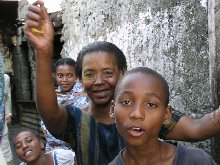 |
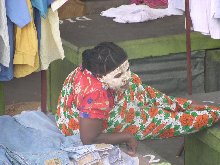 |
|
| Hospital | Locals | Lady at Market |
We
drove past the Galawa Beach, which once play host to a Sun International luxury
resort hotel which has since closed down. This
beach has an unusual connection with a Comorian member of the Al Qaeda named
Fazul. In 1996, he masterminded the
hijack of an Ethiopian Airlines plane which crashed on this beach. 79 of the 127 passengers died, including seven key Israeli
defence and aerospace industries executives, the head of CIA’s Horn of Africa
operations, and the head of Ukrainian military intelligence.
Fazul then went into hiding as a poor Moroni fishermen, only to resurface
again in 1998, when he, as Commander of East African Al Qaeda forces, executed
the bombing of the US embassies in Kenya and Tanzania.
Then he went into hiding again.
Coconut
trees swayed in the background as we sped past.
All quiet on the southern front.
----
Three
days were enough for Grande Comore. We
have seen what we had wanted to see. It’s
out of question visiting the crater of the Karthala (which used to be a major
attraction for adventure travellers) whose seismic activity has continued to
increase. It’s time to depart for
Mayotte, the island that rejected independence in a politically-incorrect
decision that scandalised nationalists and leftists of those days, and yet so
wise a decision in hindsight. For
the three independent islands of the Comoros, freedom has been a mere illusion,
a state that exists in name but not in substance.
I
watched Michel’s oversized silhouette shrunk to nothingness as our car sped
northwards for the airport. Where
would this guy be in five years’ time? I
bet he would still be here, in Moroni. Every
damned land needs a great survivor like him.
Regards,
Wee
Cheng
Post-script:
Three weeks have elapsed and Karthala hasn’t erupted.
Neither had a coup occurred. Not
yet and counting.
![]() Mayotte
& Réunion: A Rendezvous With France in Africa
Mayotte
& Réunion: A Rendezvous With France in Africa
![]() Send
your comments to Tan Wee Cheng, Singapore
Send
your comments to Tan Wee Cheng, Singapore
![]() Back to Homepage of CHASING THE INDRI
Back to Homepage of CHASING THE INDRI
![]() Back to the Main Homepage of Weecheng.com
Back to the Main Homepage of Weecheng.com